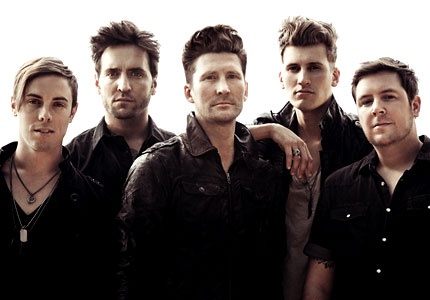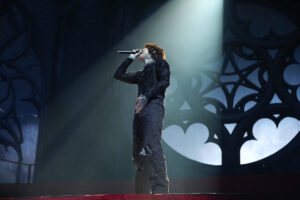In the span of over a decade, Florida alternative rockers smashed the walls down of what a Christian rock band could and should be. And though they were wary of the title (they really weren’t a “Christian rock” band), the band never wavered in delivering high-quality, often experimental music – take the Cities closer, “Fin” – an epic and emotional 8 minute song that the band actually closed with on their final tour 2 years ago, that explored faith with both suspicion and reverence. As someone who experienced that, I can safely say it was an emotionally enveloping journey.
7 full-length albums, endless touring, and many memories later, Anberlin isn’t a band anymore. But for many, they’re still a driving force in what alt-rock songwriting and performance should sound like – taking risks, but never leaving their signature sound completely behind. Of those 7 full-lengths, however, which one is really their best? It’s debatable – for many purists, it begins and ends with 2007’s landmark Cities. And for good reason, it has many of Anberlin’s most iconic songs, and was also the album where they showed their electronic influences. It can also be argued, though, that maybe it’s Lowborn (which admittedly, is a hell of a way to go out), or even 2012’s Vital that might be their overall best. With that said, let’s examine with a critical eye (and ear), Anberlin’s expansive discography, ranked worst (in this case, least awesome) to best.
Debut (2003, Blueprints For The Black Market)
Anberlin’s debut album, released way back in 2003, was a pretty uneven way to begin their career. While they displayed little of the songwriting they would later develop (as soon as the next album), Blueprints was still a decent debut. Spurred on by the catchy single “Ready Fuels” (arguably one of the best songs the band has even written), there was an undeniable energy the band brought to the table here. “Glass To The Arson” is another great track that overshadows the obvious filler here, being a fairly aggressive affair. Perhaps it was best that they released Blueprints as is – at the end of the day, it was a debut album that left fans wanting more.
The Misunderstood (2010, Dark Is The Way, Light Is A Place)
2010’s Dark Is The Way… was somehow a disappointment for many Anberlin fans. It just wasn’t Cities. And while it’s generally a mid-tempo alt-rock album the whole way through, it’s not like Anberlin really regressed in their songwriting – tracks like the emotionally wraught “Art Of War” and “Closer” are worth listening to over and over again. Perhaps this album’s biggest flaw is that even when Anberlin “goes for it” on the 1-2 punch of “We Owe This To Ourselves” and “Impossible”, they don’t truly do so like on “Godspeed” or “The Feel Good Drag”. That being said, this is still a good Anberlin album. Many other bands would kill to write an album that’s this rock solid with hooks galore, but you just can’t help but think something was being held back here. At the end of the day, it’s a misunderstood album that still warrants repeated listens.
The Developing (2005, Never Take Friendship Personal)
Let’s get this out of the way – Anberlin’s second album is an exercise in genuine excitement and sweet, sweet hooks. Almost overnight, the band developed an almost signature sound, and completely reversed the typical “sophomore slump”. Any album with tracks like “Paper Thin Hymn” and “Feel Good Drag” can’t be ranked too low – the former indeed may be Anberlin’s most iconic song overall. While Anberlin had developed their songwriting tenfold since their 2003 debut, there’s still a few filler tracks here – “Time And Confusion” seems like it could’ve been taken from Blueprints, especially. It almost kills the momentum that the first third of the album carried, though it does have a killer chorus. The good news, however, is that Anberlin showed their penchant for great album closers in “Dance, Dance Christa Päffgen”. It was ultimately a sign of things to come, considering that again, most bands would kill to write an album this good. But more was coming, and fast…
The Resistance (2008, New Surrender)
A rushed affair (and first major label album) it may have been for Anberlin on New Surrender, but the album mixes their up-tempo, occasionally aggressive material with a sense of melody that’s probably more apparent here than anything else. It’s the re-recording of “The Feel Good Drag” that could be considered their “breakout” song on the charts, but it’s tracks like “Younglife” (explores the constant theme of innocence) and the epic, apocalyptic album closer “Miserabile Visu (Ex Malo Bonum)” (which simply explodes with post-rock fury in the latter third) that make New Surrender a triumph. You can even forgive somewhat relaxed tracks like the poppy “Burn Out Brighter (Northern Lights)” when there’s gems like the anthemic opener “The Resistance” and “Disappear” to be found. Minus one or two of the lesser tracks, and New Surrender would surely rank among the band’s best.
Hearing Voices (2014, Lowborn)
Upon hearing Anberlin’s final album in 2014, I was initially let down a bit. By no means was it a bad album, or even an average one. But the album closer, “Harbinger” was a bit of a letdown, opener “We Are Destroyer” didn’t pack much bite in it (at first), and the final product felt slightly underwhelming.
And then “Hearing Voices” comes in near the end of the album, and you remember why Anberlin is one of your favorite bands. The song points out the conflictions of faith that many often face (“Everyone wants to know God/But they’re afraid of what they’ll find/Everyone wants to know God/But they want to live like he died”). Lyrically, it’s one of their more poignant albums. Vocalist Stephen Christian puts on a vocal performance for the ages, which is needed, as Lowborn is bathed in electronic washes of ambience (done incredibly well on slow-burning track “Armageddon”), and is arguably their least technical album. It’s a quite fitting end to the band’s career, as there’s very little discernible filler here. In hindsight, while “Harbinger” isn’t the best album closer the band has ever done, it’s much better when you put it on repeat – Stephen’s voice is fighting to “rise up”, if you will, over electronic soundscapes that wouldn’t sound out of place on a Tears For Fears album. Even in its darkest moments, the album soars with a vibe that possibly only Vital contains. Speaking of “We Are Destroyer”, it’s an Anberlin staple similar to “Godspeed” – a melodic but gate-crashing track with a wall of guitars, and a soaring, throaty chorus. It’s the perfect sendoff for a veteran band.
Type Three (Vital, 2012)
On Vital, the thing that sticks out the most is that Anberlin just throws the hammer down on every single song. Sure, they dial it back a bit on tracks like “Type Three” and the emphatic “Modern Age”, but it’s energetic tracks like the anthemic “Someone Anyone” and the surprisingly heavy (yet melodic) “Desires” that showed Anberlin attempting to fill arenas with a huge sound not quite found on any other album. It’s also the album that showed the band showing more electronic flourishes, but at the same time, not forgetting how to “rock”. But even on the more subdued numbers (the aforementioned tracks, also album closer “God, Drugs, and Sex”), Anberlin shows tremendous songwriting skills, especially on album standout “Orpheum” – a track that hums with electronic ambiance, and screams along like the band’s most euphoric material. There is not a single weak track here (save possibly for the lighthearted but wistful “Innocent”), and even that ranks among the better Anberlin songs. Also note this: Vital could possibly be their best album, and certainly would be if you included Devotion instead – Devotion is basically Vital with additional songs like the incredible “City Electric”. No Anberlin album has quite the vibe that Vital contains, but there’s just one album better…
(*Fin) (Cities, 2007)
Cities, Anberlin’s masterwork (in some ways, you can equate it to Deftones’ White Pony both in maturity and progression), is a masterclass in both energetic album openers (“Debut”/”Godspeed”), gorgeous and emotional acoustic songs (“Inevitable”, “The Unwinding Cable Car”), and the absolute best song Anberlin ever put to tape in “Fin”. There’s a sense of moving desperation and emotional vulnerability in tracks like “Hello Alone” that are near unmatched by any band in Anberlin’s genre.
Good luck naming a better opener/closer combo in “Godspeed”/”Fin”, because you really can’t. If tracks like “Inevitable” and “Dismantle Repair” don’t move you, I’d be genuinely stunned. Cities is the intersection of emotional vulnerability, the innocence of youth, and incredible songwriting. There are no even average tracks on this album – and we haven’t even gotten to “(*Fin)” yet. At its core, it’s an 8 minute long track that never feels too long, simply epic in every sense of the word.
Cities is as it was upon its 2007 release – an ambitious, melodic, but still heavy alternative rock record. It’s an album full of career standouts, all killer, and no filler. It will choke the life out of you in an emotional sense, leaving you breathless until the end with majestic peaks and valleys.
How about you? How do you rank Anberlin’s discography? Sound off in the comments. Anberlin will live forever.





More Stories
Patient Sixty-Seven continue to rack up impressive numbers on new EP, ‘What If It Never Gets Better’
Linkin Park’s super heavy “QWERTY” has been unveiled to the world, and predictably, it’s going viral on social media
Good news! Deftones have almost finished their upcoming tenth full-length album